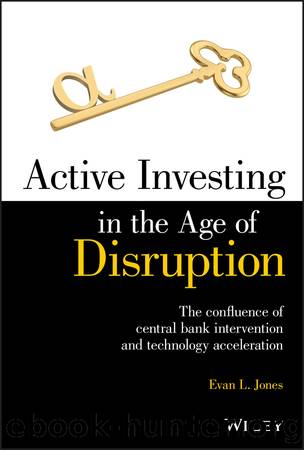Active Investing in the Age of Disruption by Evan L. Jones

Author:Evan L. Jones [Jones, Evan L.]
Language: eng
Format: epub
ISBN: 9781119688129
Publisher: Wiley
Published: 2020-04-21T00:00:00+00:00
If you are invested in the roll-up company for fundamental business reasons and think the company is truly adding value to both customers and shareholders by consolidating the industry, it is important to recognize that many other shareholders are not invested for that reason. They are momentum investors that think it's a sexy story; if it gets rocky they are going to move onto the next hot stock. The volatility of both the stock and earnings are issues a manager needs to be prepared for when entering a roll-up investment.
Why do roll-ups implode at some point in the public markets?
The typical roll-up company begins in a fast and furious manner as the management team touts their strategy on Wall Street, which they do to both help their stock compensation plans and because they need their stock to be valued highly to allow for acquisitions to be done at reasonable prices. If the CEO has been involved with a successful roll-up in the past, the story is better. This creates excitement among investors, such as hedge funds, and the stock starts to move and attracts momentum investors. The company starts making acquisitions usually at a fast pace, which drives sales growth and makes for great early investor earnings calls as sales ramp higher. These great early earnings releases attract more momentum investors.
The roll-up company deal team finds acquisition targets, negotiates deals, and turns it over to the legal team to complete. The legal team finishes and hands it off to the operational integration team; meanwhile, the deal team is finished negotiating a new deal. The deals build on each other. If this were a purely technical process, maybe it would run smoothly, but acquisitions and integration involve people. As noted previously, the number one reason acquisitions fail is due to culture or people issues. The business owners and teams of the newly acquired companies do not always integrate smoothly into the parent company assembly line. In fact, almost by definition, business owners do not like the idea of being part of a larger company and they push back on changes and often quit. In a 20-year analysis of entrepreneurial activity by PriceWaterhouse, it was found that over 70% of entrepreneurs left their company within a year after it was sold. Company founders are often integral to success, but difficult to keep involved and incentivized after being acquired.
Company integrations are more often messy than smooth. That does not mean that they cannot get fixed after a few rocky months; it just means the strategy looks a lot cleaner and smoother on the analyst's spreadsheet than it can ever be in reality. On the spreadsheet, there are three acquisitions every quarter and 8% quarter over quarter growth with a 50 basis point margin increase every quarter. In reality a few large customers are lost, some owners quit, and unforeseen expenses crop up. Invariably the public roll-up management team glosses over these issues with their public shareholders using the rationalization that they are minor setbacks in the broader compelling opportunity.
Download
This site does not store any files on its server. We only index and link to content provided by other sites. Please contact the content providers to delete copyright contents if any and email us, we'll remove relevant links or contents immediately.
| Analysis & Strategy | Bonds |
| Commodities | Derivatives |
| Futures | Introduction |
| Mutual Funds | Online Trading |
| Options | Portfolio Management |
| Real Estate | Stocks |
Rich Dad Poor Dad by Robert T. Kiyosaki(6607)
Pioneering Portfolio Management by David F. Swensen(6288)
How To Win Friends and Influence People by Dale Carnegie(4498)
The Money Culture by Michael Lewis(4197)
The Dhandho Investor by Mohnish Pabrai(3758)
The Wisdom of Finance by Mihir Desai(3729)
Liar's Poker by Michael Lewis(3441)
Fooled by Randomness: The Hidden Role of Chance in Life and in the Markets by Nassim Nicholas Taleb(3105)
The ONE Thing by Gary Keller(3062)
The Intelligent Investor by Benjamin Graham Jason Zweig(3035)
Mastering Bitcoin: Programming the Open Blockchain by Andreas M. Antonopoulos(3035)
The Psychology of Money by Morgan Housel(2970)
Investing For Dummies by Eric Tyson(2948)
Rich Dad Poor Dad: What The Rich Teach Their Kids About Money - That The Poor And Middle Class Do Not! by Robert T. Kiyosaki(2948)
How to Day Trade for a Living: Tools, Tactics, Money Management, Discipline and Trading Psychology by Andrew Aziz(2942)
How to Win Friends and Influence People by Dale Carnegie(2905)
Market Wizards by Jack D. Schwager(2696)
How to Pay Zero Taxes, 2018 by Jeff A. Schnepper(2646)
Zero Hour by Harry S. Dent Jr. & Andrew Pancholi(2644)
